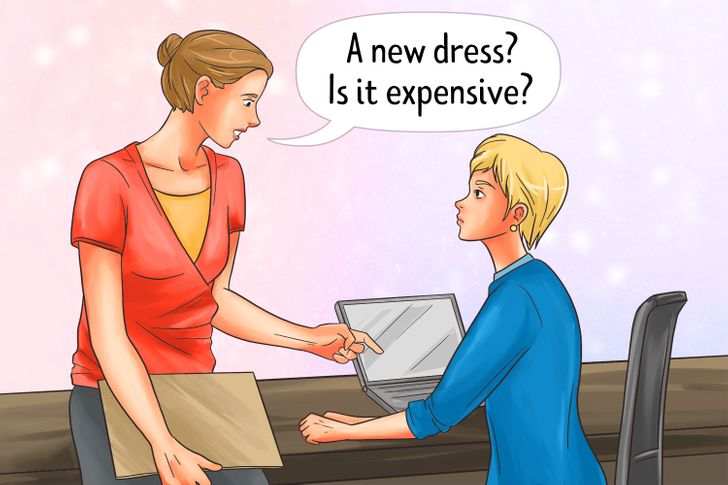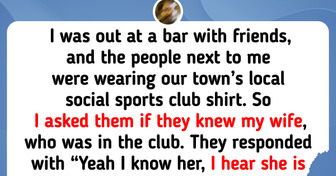I wish all the people on the planet would read it! Some of the questions aren't very obvious, thanks for letting us know:)
6 Questions That Polite People Just Don’t Ask
The ability to make small talk is a good skill both for at work and in life. But even polite people sometimes unintentionally ask questions that can cause an interlocutor’s rejection and the wish to isolate themselves. And very often it’s not clear what the issue is all about.
We at Bright Side have analyzed the questions that people ask strangers in conversations most often. We chose ones that you’re better off avoiding — especially if you want to make good contacts and carry on a good conversation.
1. “Is that your mother?”

If you don’t know for sure what kind of a relationship people in front of you have, you’d better not try to guess and name the variants. It’s likely that your interlocutor will be pushed away by questions such as:
- “Is it your mother/sister/brother/son?”
- “Are you related?”
You can mistakenly call an elder sister a mother, or call people who don’t like each other relatives. Resembling each other can be a big offense for them. It’s much simpler and more polite to make the conclusion about what relationship status people in front of you have by watching their behavior, mannerisms, and speech.
2. “How long have you been together?”

People like to talk about their own relationships and the relationships of others. However, if your interlocutors aren’t sharing their relationship status right away, you’d better not ask them how long they’ve been seeing each other and whether they are married or not.
People in front of you might turn out to be simple acquaintances who decided to come to the party together. Questions about marriage can be unpleasant for couples that have disagreements on this topic.
3. “When are you going to have a baby?”

Here are some other questions you are better off avoiding:
- “Do you have kids?”
- “Are you pregnant?”
- “Did you want a baby boy or a baby girl?”
We can assure you that any mother of multiple kids repeatedly gets asked the question, “Are they all yours?” This likely makes her go mad! A question about having kids can annoy child-free couples and upset those who can’t have a baby. Additionally, the pregnancy topic can sound like a tease or a hint about being overweight.
If your interlocutor came with kids, it’s better to ask about their interests and if they’re without kids, it’s better to find a more neutral topic for your initial conversation.
4. “Will it stay forever?”

Of course, people are less likely to speak about obvious and visible health issues of their interlocutor but they often ask irrelevant questions about the specifics of one’s appearance like:
- “Was it painful?”
- “Is it real?”
- “Where did you get your [blank] done?”
Very few people actually find it interesting to tell strangers about their tattoos, piercings, and dreadlocks. Moreover, one should never touch other people or items on them — it’s a violation of personal space.
Asking about cosmetic procedures a person has undergone is not an indicator of good manners either. Even if you’re sure that the person in front of you visits a solarium, you shouldn’t ask them for salon contacts. Perhaps this person wants to pretend that this is their natural skin color and your question might spoil their mood.
5. “Why do you need it?”

Hobbies are a good topic for small talk — It can make strangers good friends. However, there is also a range of questions that can embarrass an interlocutor. For example, asking why a person needs 5 dogs or why they have such an expensive hobby is definitely not a pleasant question. Your interlocutor might think that you consider their hobbies silly.
6. “How much does it cost?”

Few people ask their interlocutors how much they earn. Instead, they might try to find out how much experts in this sphere earn in general.
Moreover, people don’t like to admit that their salary is not that high and they simply like their job. Or that they don’t like their job and want to change it but haven’t found the right opportunity yet. Anyway, questions about money and remunerations are too personal to be asked.
- “How much was it?”
Purchases can be another uncomfortable topic. Perhaps you simply asked about the cost of the item because your friend has recently bought the same thing and you simply want to compare the prices. But your interlocutor might think that you’re trying to assess their financial status and their ability to afford certain purchases.
How to answer embarrassing questions:
What if someone asks you unpleasant questions? The following actions might be of great help:
- Change the topic.
- Give a short answer.
- Refuse to answer.
Very often, ignoring a question will be enough to make your interlocutor understand that it’s embarrassing for you. Changing the topic and giving a short answer is also a good signal that you don’t like it.
However, if your interlocutor insists on the answer, you can simply say, “I don’t want to talk about it, let’s change the topic.” It’s much better than getting angry, nervous, and irritated at the topic you don’t like.
Questions set the course of the conversation. Learning to ask them correctly means becoming a good interlocutor who attracts other people. Have you ever faced an embarrassing situation because of awkward questions?
Comments
Some people need to read this?
That's a useful article!
Related Reads
I Installed a Secret Camera After My MIL Insisted on Having Our Key

My Ex-Husband Spent the Money Saved for Our Son on His Stepdaughter

My Son Brought His Fiancée Home – I Immediately Called the Police

I’m Utterly Shocked After Overhearing My Fiancé and His Mom’s Malicious Plot Against Me

14 Innocent Souls Who Learned a Lesson the Hard Way

I Gave My House to My Son — He Betrayed Me in a Horrific Way

I Didn’t Want My Ex’s Wife at My Son’s Graduation — The Result Was Devastating

12 Turns of Events That Freaked People Out

I Will Not Look After My Stepchild During a Romantic Getaway

My Stepdaughter Can Stay Only If She Babysits — My Home Isn’t a Charity Center

13 Thanksgiving Dramas That Were Juicier Than the Turkey

10+ True Stories of People Finding Out Their Partner Was Cheating
